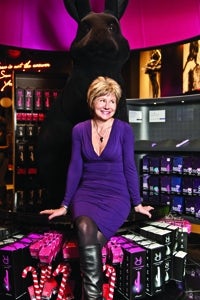Q&A: M&S head of UK franchise, Paul Horwell
- Read this week’s cover feature: Brands who entrust their precious business to others
- McBride is one of the UK’s biggest makers of branded and supermarket cleaning products: read about them here
- Chief executive of Moto, Tim Moss, tells us what it’s like to run someone else’s brand

Marketing Week (MW): When and why did Marks & Spencer start franchising?
Paul Horwell (PH): We thought long and hard about whether it was right to franchise the M&S brand in the UK. We’d been doing it for many years abroad, primarily with clothing, but it’s not something we’d really considered in the UK.
We have franchised M&S Simply Food since 2001. The concept around that was making M&S convenience food even more convenient. We looked around all the places on the high street that we’d like to put it and realised there were lots of places that we didn’t have expertise in. We decided to work with some other people and the railway stations were the first places we decided to do that.
We work with SSP because it has access to property in that market and it understood the sector and how to make things happen.
MW: Why not just open stores in train stations yourself?
PH: There are simple things like delivery access – there’s a whole complication when you are working in a railway station compared with a high street or out-of-town complex, and SSP knows how those things work.
It has relationships with station managers and landlords too. Some of that we could have learned over time and we now have contacts with those guys ourselves, but that is SSP’s core business. Why not work with someone who understands that trading environment, knows all the key decision-makers and can make things happen quickly?
MW: What is the best way to let someone else run your brand?

PH: Once you have overcome the barrier of trying to work with a partner, the real key is in choosing the right partners to work with.
We only have three partners in the UK and spent the majority of the time making the decision on which we work with. We only work with SSP, Moto [for motorway service stations] and BP [in petrol station forecourts].
We have a very good understanding of the M&S brand and our partners have a very good understanding of their chosen environments. So when you put those bits together, you get something that is quite special.
MW: What are the challenges in letting third parties run your brand?
PH: There are some bits that are slightly different. BP uses a different till system, for example. Some airports and forecourts operate for 24 hours, so we have to make sure we have food availability. I wouldn’t say it is a difficulty, it is just something we weren’t used to before.
One thing we have to be mindful of is that if we speak to a store manager at a franchise, we are not talking directly to an M&S employee; we are talking to a manager of a third-party operator. The employees are those of the partners. We put them through quite a bit of training to make sure the customer experience is seamless.
We want the customer experience to be the same so we want staff to have the same mindsets that we have in our own shops. That applies to something as simple as our policy of charging for carrier bags.
We now have 210 franchised stores and without strong relationships we would never have been able to do that. Therefore, maintaining those relationships on an ongoing basis is a focus. A lot of the stuff I do with my team and franchise partners’ teams is making sure they bond.




